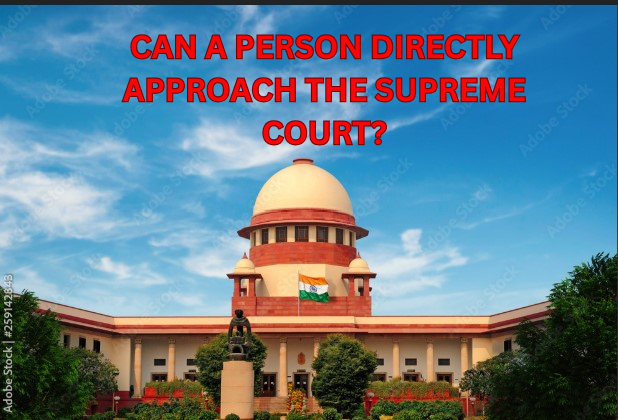Yes, an individual can directly approach the Supreme Court under Article 32, if there is an
alternative remedy available before the High Court U/A 226 of the Indian Constitution.
“According to Article 32: The right to move the Supreme Court by appropriate proceedings for the
enforcement of the rights conferred by this Part is guaranteed.”
In the case of Whirlpool Corporation v. Registrar of Trademarks, Mumbai (1999), the Supreme
Court carved out certain exceptions where the doctrine of alternative remedy would not be
applicable, and the person can directly approach the court to enforce their rights. Includes:
- Infringement of fundamental rights and principles of natural justice
- Where the proceedings are wholly without jurisdiction
- When the remedy available is not equally efficacious
- Where the vires of the Act is challenged
Analyze the doctrine of alternative remedy—
Doctrine of alternative remedy is a legal principle that emphasized that the petitioner is to avail of
the other statutory remedies available before seeking a writ remedy. This doctrine emphasized that
writ petitions are not maintainable before the High Court under Article 226 where an equal,
efficient, and adequate alternative remedy is available.
Judicial activism has given birth to the doctrine of existence of alternate remedy whereby the High Courts and Supreme Court can refuse
to entertain a petition in cases where an alternate and equally effective alternate remedy exists.
The Supreme Court of India in the case of Union of India v. T.R. Verma (1957) used the word
“alternative remedy” and in his remarks said that “It is well settled that when an alternative and
equally efficacious remedy is open to a litigant, he should be required to pursue that remedy and
not invoke the special jurisdiction of the High Court to issue a prerogative writ.”
Constitutional Context
Article 226 of the Indian Constitution gives power to the High Court to entertain the writ petition
made under the violation of the constitutional or legal rights of the individual.
Moreover, High Court has discretionary power to entertain or not entertain such writ petition
demanding the enforcement of the fundamental right or the constitutional rights, but when the
High Court sees that there is an alternative remedy available, then it directs such person to entertain
first by such other alternative remedy.
As per the case of Union of India v. T.R. Verma (1957), the Supreme Court made a statement that
“It is well settled that when an alternative and equally efficacious remedy is open to a litigant, he
should be required to pursue that remedy and not invoke the special jurisdiction of the High Court
to issue a prerogative writ.”
Exceptions to the Doctrine determined by the judicial pronouncements
- In Re. A.V. Venkateswaran v. R.S. Wadhwani (1961): Supreme Court conferred that the
existence of an alternative remedy is considered as a factor, but it does not eliminate the
authority of the High Courts under Article 226. Further, the court in his ruling stated that if the
case involves a fundamental breach of justice or lack of jurisdiction, the writ jurisdiction
remains open for the aggrieved party. - L. Chandra Kumar v. Union of India (1997): In the case, the Supreme Court in his remarks
said that “In the case of violation of the constitutional rights or issues are at stake, then the
doctrine of alternative remedy has limited effect.” - Radha Krishna Industries v. State of Himachal Pradesh (2021): The Supreme Court in this
case set some principles, highlighting the limited effect of the doctrine of alternative remedy
when:- Writ can be issued for enforcing fundamental rights and other purposes.
- High Courts can turn down writ petitions, especially when an effective alternative
remedy exists. - Exceptions to the doctrine of alternative remedy will include situations
- Calling for enforcement of fundamental rights;
- Showing breach of principles of natural justice;
- Demonstrating proceedings without jurisdiction; and
- Where the vires of a legislation is contested.
- The presence of an alternative remedy does not automatically strip the High Court of its
authority, yet writ petitions should not be allowed when an efficacious alternative exists. - For rights created by statutes with prescribed remedies, those remedies should be exhausted
first. this is a rule of policy, convenience, and discretion. - High Courts may step back from writ jurisdiction in cases involving disputed facts. However,
if the Court objectively considers the dispute requires exercise of its writ jurisdiction, such a
view will not readily be interfered with.
Is availability of alternative remedy a bar to maintainability under Article 32?
No, availability of an alternative remedy does not operate as an absolute bar to the
“maintainability” of a writ petition. (According to the case M/S Godrej Sara Lee Ltd. v. The Excise
and Taxation Officer-Cum-Assessing Authority & Ors.)
As per Article 32(1) of the Constitution of India: “The right to move the Supreme Court by
appropriate proceedings for the enforcement of the rights conferred by this Part is guaranteed.”
This article is a fundamental right itself; therefore, it grants unrestricted power to the individual to
directly approach the Supreme Court for the purpose of the enforcement of their fundamental
rights, regardless of whether the alternative remedy exists or not.
Conclusion:
On the sole basis of availability of alternative remedy is not a bar to the maintainability under
Article 32, which deals with a fundamental right. However, whether the Supreme Court chooses
to entertain such writ jurisdiction or not is the discretionary power of the Supreme Court.
References
- The Constitution of India, 1950 (Bare Act)
- Priya, Case Summary: D.K. Basu v. State of West Bengal, available at https://legalfly.in/d-k
basu-v-state-of-west-benga/ - Sushant Ria, Study of Article 32 and Article 226 of the Constitution of India, available at
https://www.legalserviceindia.com/l - De Facto, Constitutional Remedies: Article 32 and 226, available at
https://www.defactojudiciary.in/ - Byjus, What is writ, https://byjus.com/free-ias-prep/types-of-writs-in-india/
- By Drishti Judiciary, Article 226 of the COI, https://www.drishtijudiciary.com/current
affairs/article-226-of-the-coi - Constitution of India, 1950 (Bare Act), Indian Kanoon, https://indiankanoon.org/doc/981147/

